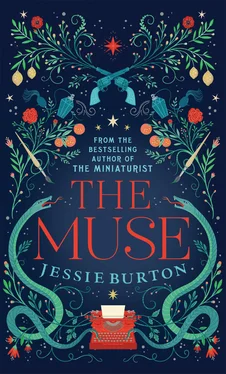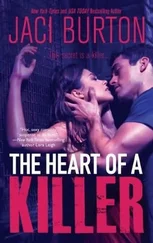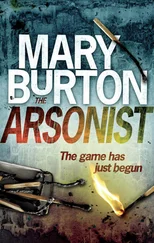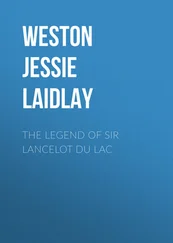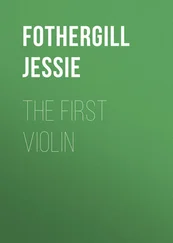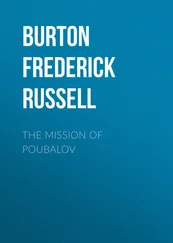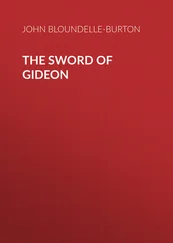Even today, Pablo Picasso still stays away from the Andalusian city of Malaga, despite being its most famous son. When Spain broke apart, many artists escaped the cracks, fleeing to France or America rather than endure isolation, imprisonment and possible death. Life in its variety was cauterized, and so was art. For the poet Federico García Lorca, it was too late to escape. One can only surmise that his fellow Andalusian, the painter Isaac Robles, may have met a similar fate.
Spain’s past is a cut of meat turning green on the butcher’s slab. When the war ended, people were forbidden to look back and see the circling flies. Soon they found themselves unable to turn their heads, discovering that there was no language permitted for their pain. But the paintings, at least, remain: Guernica , the works of Dalí and Miró — and now Rufina and the Lion , an allegory of Spain, a testament to a beautiful country at war with itself, carrying its own head in its arms, doomed for ever to be hunted by lions.
By the end of Herbert’s essay, you would imagine that Isaac Robles was well on his way to becoming highly collectible, enjoying a second renaissance of prices the likes of which the humble painter himself would never have dreamed. Herbert sounded so sure that he knew what the painting was about, that Isaac Robles had intended a political commentary on the state of his country. But I thought the painting, combined with the images of Justa in Women in the Wheatfield , seemed more personal — sexual, even.
By the Thursday, when Barozzi and the other Guggenheim people from Venice arrived with their paintings — an ambassadorial art entourage, with better presents and suits — Quick was still not back, and Reede was furious.
‘She’s not well,’ I said. Quick wasn’t answering her telephone. The nearer the exhibition had drawn to opening night, the further she had shrunk away from it. Even though I feared the pressure of the impending opening was crushing her, I almost hoped it would crack her open whatever the consequence, so the secret she was hiding from me would be forced into the light.
‘I don’t care if she’s on her deathbed,’ Reede raged, and I shuddered at his macabre accuracy. ‘This is the most important visit to happen to the Skelton in all my twenty years and she can’t even be bothered to show up?’
He was in an extremely bad temper, for he had failed in his bid to get the Prado museum in Madrid to loan him the Goya. ‘Then who’s the person I can speak to in the convent with the Murillo?’ I had heard him saying through his open door one afternoon.
In Quick’s absence, Reede had directed the hanging of the paintings himself, ordering Pamela and me to oversee the tea-making and the clearing up of boxes, packing crates and twine. The Venetians were very friendly, I recall, and slightly disturbed by the freezing London winter. ‘Have you ever been to Venice?’ one of them asked me.
‘No,’ I said.
‘Go. It is like the theatre has been turned onto the street.’
The photograph of Isaac Robles and the unnamed woman had been blown up to cover four enormous boards. Two archivists were trying to affix it to the end of the gallery wall. No one dared point out that the camera was clearly centred on the slightly blurred face of the smiling young woman, holding the brush. ‘It’s the only photograph we have of him,’ Reede said, ‘so it’s going in.’
The Venetians pulled their own Isaac Robles out of a crate and a gasp went up from Pamela.
‘Oh, Dell,’ she said. ‘Look.’
The Orchard was indeed worth gasping at. It was stunning, far larger than I was expecting, at least five foot long and four high. The colours had lasted well over the past thirty years — it was so vibrant and modern in its sensibility, it could have been painted yesterday. There were echoes in the patchwork fields of Rufina and the Lion , but the detailing was almost hyper-real, diligent on the ground, giving way to a symphony of brushstrokes in the sky.
‘It is my favourite,’ admitted one of the Venetians.
‘It’s beautiful.’
‘Where does Signor Reede want it?’
I looked at the plan. Reede wanted Rufina and the Lion to share a wall only with Women in the Wheatfield , which was still in its crate. The Orchard , because of its size, was unlikely to share wall space. ‘Put it here for now,’ I said, indicating that the Venetians could park it safely in a corner of the gallery.
Although it was very exciting to be in that space that day — opening the wooden crates, like Christmas on a grand scale; sawdust and nails everywhere, and a magical sense of occasion — I had a deep feeling of unease. Yes, there was the momentousness of this being Isaac Robles’ first ever London exhibition — but the one snag was that Quick didn’t think Isaac Robles painted these paintings at all.
I wandered down the gallery to take another look at the photograph, and stood before the woman I was so sure was Olive Schloss, Rufina and the Lion half-finished behind her. It felt imperative that I understand this photograph, that it was the key to unlocking the truth about that painting, and what was happening to Quick. I sought in that girl’s slightly blurred face a younger Quick, full of hope and passion. And although Quick had become gaunt over the past months, I believed I could see in this bounteous, full visage the girl she once had been. But I could not be sure of it. Over the last months, Quick had given me so much, in a way — and yet at the same time, so little. My desire for answers had supplied me with my own, and although they were attractive to me, they were not necessarily true. Looking again at this life-size photograph, and with no time left, I knew what I had to do.
In my lunch break, I sneaked up to Quick’s office and took some Skelton headed paper from her supplies, hurriedly practising Reede’s signature several times on a notepad. I typed up a brief letter of introduction and explanation, with regards to enhancing the contents of ‘The Swallowed Century’, before taking a deep breath and faking Reede’s squiggle at the bottom. With the letter in my handbag, I walked over to the main office of the Slade School of Art on Gower Street, and asked to check their alumni records. They barely glanced at the letter, and I spent the whole hour looking through 1935 to 1945.
No Olive Schloss had ever been registered. It felt like one of the last remaining threads had snapped, but I refused to believe that Olive had truly disappeared. She was in the Skelton, on those walls, surrounded by her work — she was in Wimbledon right now, a person I was determined to pin down. I found a phone box and dialled Quick’s number, praying that she would answer.
‘Hello?’
‘You never made it, did you?’ I said.
‘Odelle, is that you?’ The words came out oddly, her voice slurring. She sounded frail, and my relief at finally hearing her voice soon gave way to fear.
‘Quick, I’ve been to the Slade.’
There was silence on the other end. I went on, frustrated and desperate, my face getting hot, my heart beginning to thump. ‘No Olive Schloss ever registered at the Slade. But you knew that, didn’t you? Just tell me the truth.’
‘The Slade?’ she repeated. ‘The Slade. . why were you at the Slade?’
‘Quick, the exhibition opens tomorrow. Isaac Robles is going to get your glory. I don’t think you should be alone.’
‘I’m not alone.’ She stopped, wheezing for breath. ‘I’m never alone.’
I peered through the phone box’s grimy squares of glass, Londoners rushing back and forth in front of me. I felt as if I were underwater, and their bodies were not really bodies, just smudges of colour, moving across my sight.
Читать дальше
